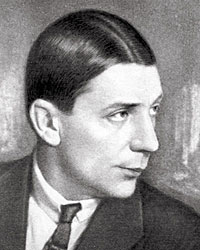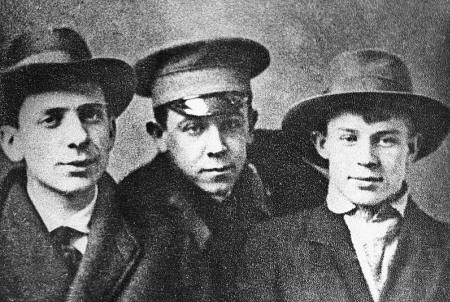

Queer Places:
Vagankovskoye Cemetery
Moscow, Moscow Federal City, Russia
 Rurik
Ivnev (born Mikhail Alexandrovich Kovalyov, 23 February [O.S. 11
February] 1891 – 19 February 1981), was a Russian poet, novelist and
translator.
Life before article 154, first published in 1995, is the long-hidden diary of
Ivnev and reveals the rich sensual life of Russia's intelligentsia before Stalin's homosexual purge.
Sergei Yesenin met
Nikolai Klyuev, the leading
figure in a group of 'peasant poets', in 1915. They had an affair that lasted
until 1917, and Yesenin addressed several love poems to the older man. One of
his biographers says `it is clear that Yesenin met with the homosexual
advances, not only of Klyuev, but of others', for he was moving in a
distinctly gay cultural environment; and indeed, the writer coyly adds, He may
have succumbed to the pressure of the milieu and discovered in himself a
latent bisexuality.' He later became associated with the Russian Imagist
movement, which included the poets Ryurik Ivnev and
Anatoly Marienhof, both
homosexual; and appears to have had a three-year affair with the latter.
However, Yesenin 'came to resent playing second fiddle to Klyuev' as a poet.
On 25 December 1925, he visited Klyuev and got a lukewarm response to poems he
read out. Some time early in the morning of 28 December, he hanged himself.
Rurik
Ivnev (born Mikhail Alexandrovich Kovalyov, 23 February [O.S. 11
February] 1891 – 19 February 1981), was a Russian poet, novelist and
translator.
Life before article 154, first published in 1995, is the long-hidden diary of
Ivnev and reveals the rich sensual life of Russia's intelligentsia before Stalin's homosexual purge.
Sergei Yesenin met
Nikolai Klyuev, the leading
figure in a group of 'peasant poets', in 1915. They had an affair that lasted
until 1917, and Yesenin addressed several love poems to the older man. One of
his biographers says `it is clear that Yesenin met with the homosexual
advances, not only of Klyuev, but of others', for he was moving in a
distinctly gay cultural environment; and indeed, the writer coyly adds, He may
have succumbed to the pressure of the milieu and discovered in himself a
latent bisexuality.' He later became associated with the Russian Imagist
movement, which included the poets Ryurik Ivnev and
Anatoly Marienhof, both
homosexual; and appears to have had a three-year affair with the latter.
However, Yesenin 'came to resent playing second fiddle to Klyuev' as a poet.
On 25 December 1925, he visited Klyuev and got a lukewarm response to poems he
read out. Some time early in the morning of 28 December, he hanged himself.
Rurik Ivnev was born into a nobleman's family in Tiflis (Tbilisi). His father, Alexander Samoylovich Kovalyov, was a Russian army captain. The children (Mikhail had an elder brother, Nikolai) had been brought up by their mother, Anna Petrovna Kovalyova-Prince. Among her ancestors was a Dutch count, who arrived in Russia with Peter I. After the death of their father in 1894, the family moved to Kars, where their mother obtained the position of principal in an all-girls secondary school. At the insistence of their mother, the sons entered the Tiflis Military School, where Mikhail studied from 1900 through 1908. Upon graduating from the school, Mikhail thought better of a military career and headed to St. Petersburg, where he became a student at the Law Department of the St. Petersburg University. In 1912 he was forced to leave St. Petersburg University and moved to Moscow to continue his education. In 1913 he graduated from Moscow University with a law diploma and returned to St. Petersburg, where he began his service at the office of government control.

Rurik Ivnev, Vladimir
Chernyavsky and Sergey Yesenin on March 28, 1915 at the evening of
contemporary art “Poets to the Warriors”. Here is how V. Cherniavsky himself
recalls this: “I, standing with two young poets by the door to the hall, saw a
boy climbing the stairs, dressed in a gray jacket over a bluish satin shirt,
with blond, almost very short-cut hair, curled in a small strand on the
forehead. His companion stopped near our group and told us that he was a
village poet from the Ryazan territories who had recently arrived. The boy,
holding out his hand in turn, gave each of us his last name: Yesenin ... The
guest was at that time unusual. From the questions he answered eagerly and
simply, it turned out how he came straight from the station to Blok, how he
directed him to Gorodetsky, what he read in many Petersburg poets in his
homeland, he wants to get to know everyone and read to them what brought it. "
Then S. Yesenin, Rurik Ivnev and V. Chernyavsky were photographed together.
Poets quickly became friends.
Rurik Ivnev's first attempts at poetry date from 1904. His first publication was the poem Our Days in a 1909 student almanac that came out in Vyshny Volochek. Two years later he showed his poems and prose to Alexander Blok and received his unfavorable opinion. Another two poems were published in 1912 in the Bolshevik newspaper Iskra.. Soon, Mikhail, together with Vadim Shershenevich, Konstantin Olimpov and Vasilisk Gnedov, joined the Ego-Futurist movement and became a frequent contributor to Ego-Futurist almanacs published by Peterburgskiy Glashatay, Tsentrifuga and Mezzanin poezii. In 1913 his first book of poems, Self-immolation, was published.
Mikhail Kovalyov became Rurik Ivnev. The poet himself said that this pseudonym was dreamed up in his sleep on the day before the print of Self-immolation. The book brought the young poet a great reputation. He became a frequent visitor to St. Petersburg literary salons where he met with Dmitry Merezhkovsky, Zinaida Gippius, Mikhail Kuzmin, Nikolay Gumilyov, Anna Akhmatova, Fyodor Sologub and Vladimir Mayakovsky.
After the Revolution, Rurik Ivnev, now in Moscow, joined a new poetic trend, Imaginism, with which he was mainly associated in the 1920s. In 1925 Ivnev visited Germany, then worked in Vladivostok at the Knizhnoe delo publishing house. In 1927 he visited Japan. In the second half of the 1920s Rurik Ivnev published an epic trilogy, The Life of an Actress, which contained the novels Love without the love (1925), The Open House (1927) and The Hero of Novel (1928).
With increasing oppression from the Soviet authorities in 1930s and 1940s, Ivnev was reduced to earning his living through translations of foreign-language poetry and writing historical plays. In the late 1930s he worked on an autobiographical novel, At the Foot of Mtatsmindy. In the same period Ivnev began to work on another autobiographical novel, Bohemia,, which he completed in the month before his death. At the time he lived in Tbilisi and translated Georgian poetry. In 1950 he returned to Moscow.
After the Stalinist era came to an end, he worked on his memoirs. He died four days before his ninetieth birthday.
My published books: